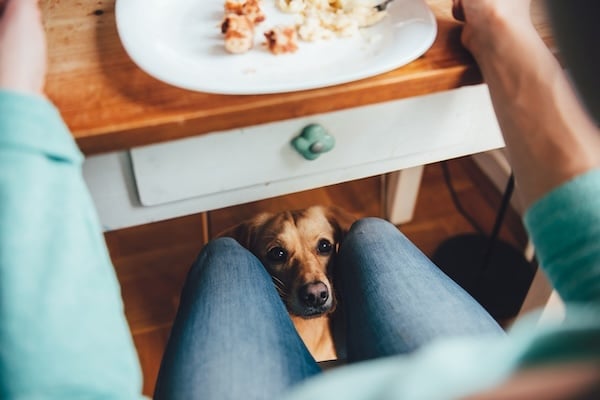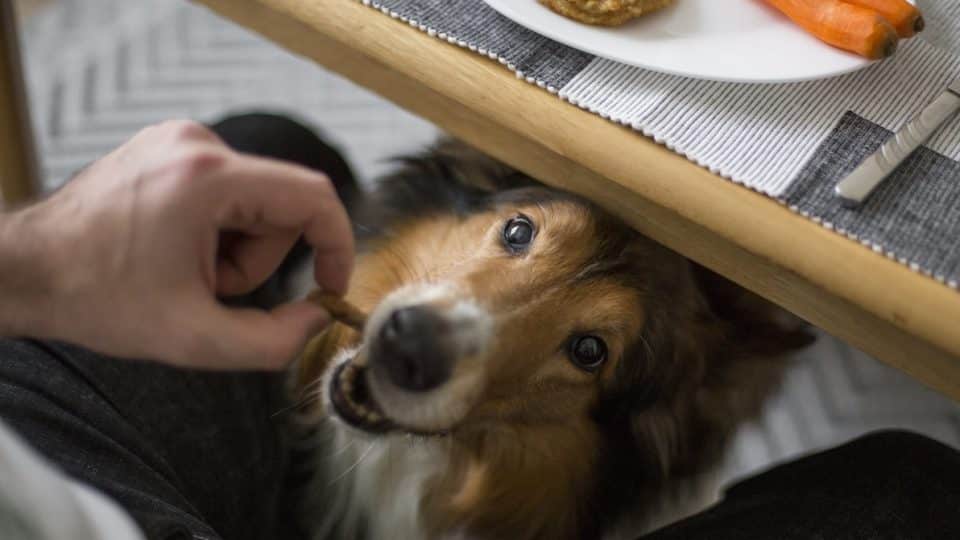- Not a substitute for professional veterinary help.
Does your dog paw at you, butt you with their head, or whine when you sit down for dinner? Do they act like they’re withering away and starving every time you have food in your hand? Sounds like you’ve got a beggar on your hands. But why do dogs beg for food when they’ve got their own, and what can you do about it?
Most likely, your dog’s not just hungry. They’ve probably learned that if they communicate a certain way (cue the giant puppy eyes), you’ll grant their request to kindly taste-test your food.
If this sounds like your situation, we’ve got you covered. We spoke with Nicole Kohanski, a certified dog trainer, animal behaviorist, and founder of Wiggle Butt Academy, to get expert advice on why dogs beg. We also discuss when begging is a problem and when it isn’t and how to curb the behavior.
How Dogs Learn To Beg for Food
Dogs learn to beg because the behavior has been reinforced. Think of it like this. When you teach your dog a new cue, like “shake” or “sit,” you reward them with a delicious treat every time they do the trick to encourage them to do it again. Begging works the same way. Every time your dog hits you with those big brown eyes, and you give them a piece of food or your attention, they learn that begging works.
Kohanski says this interaction is what trainers call “The Law of Effect.” Simply put? Behaviors followed by desirable outcomes are more likely to be repeated.
Here are some other factors that come into play.
Social interaction
Some dogs are simply vying for your attention, even if you don’t have food. You may notice that your dog is more apt to do this when you’re in a conversation or, heaven forbid, interacting with another pet (the audacity!).
To combat this, make sure you’re spending enough quality one-on-one time with your pup and that they’re getting enough enrichment throughout the day. If you know you’re having guests over later, plan ahead. Go for a long walk beforehand and give your pup activities, like a puzzle toy, while your visitors are at your house.
Hunger
Some pups may actually be hungry when they paw at your leg during dinner. If your dog doesn’t usually beg and is begging for food all of a sudden, it might be worth revisiting how much you’re feeding your dog, especially if you changed food recently or your dog is going through a growth spurt.
Curiosity
Sometimes dogs are just genuinely curious about what you have or what you’re doing. They may just be gathering information and leave you alone once their curiosity has been satisfied.
Stress
Some dogs beg because they’re stressed or anxious. For example, if your dog recognizes your routine, they may start exhibiting begging behaviors when you’re about to leave the house, especially if it’s caused you to change your plans in the past.
How dogs know who to beg from
Dogs don’t necessarily know who has the softest heart and weakest willpower, but they do remember when they’ve had a positive experience with someone. They also create associations with people who make them feel happy and content and can get a read on a person by their body language and tone.
And, of course, if a specific person has (knowingly or not) reinforced begging, a dog is likely to turn to them to get what they want.

Kerkez via iStock
How To Stop Dogs from Begging
To get a dog to stop begging, Kohanski recommends a three-tier approach:
- Quit reinforcing it
- Eliminate opportunities to practice the behavior (through management)
- Reinforce a different behavior you’d prefer
Stop reinforcing it
The first step to getting a dog to stop begging is to ignore or redirect their unwanted behaviors when they make their request. This means that when your dog paws at you, head butts you, and jumps on you, you don’t respond in a way that resolves their desire for food, attention, or interaction. It’s important that all members of the household (and guests) commit to not reinforcing the behavior.
Implement management
Kohanski also recommends managing and rearranging your dog’s environment so they won’t even have the chance to beg. For instance, put your pup behind a dog gate or in a crate with a stuffed KONG while you’re eating.
You may also want to reconsider your dog’s mealtimes and how they align with when you eat. If your dog’s not hungry when you have your meals, they might not be so inclined to beg.
Teach a new behavior
Next, you’ll want to teach your dog what you’d like them to do instead of begging. This could look like teaching them to go to a specific place, like a mat, bed, or crate, while you have dinner.
Or maybe you’d prefer that they offer a sit or down instead of jumping up on you or pawing at you when you have something in your head. The goal here is to reinforce the new behavior with treats, praise, or whatever your dog loves to make it more reinforcing (and likely to be repeated).

Zontica via iStock
Is Begging Always a Problem?
If you don’t mind that your dog begs, then it’s not an issue! Kohanski notes that, in her experience, begging does not lead to behavioral issues like resource guarding. Keep in mind, however, that there may be times when begging would be unwelcome, perhaps with guests or if you’re dining at a dog-friendly restaurant. Young children and older folk might also be frightened or injured by a dog that jumps on or paws at them.
Remember: dogs do what’s been reinforced. They don’t necessarily know in which context things are acceptable or not. So it wouldn’t be fair to keep rewarding the begging and then be upset with them when they do it at times you’d rather they not.
One thing you can do, though, as Kohanski points out, is to put begging on cue. That way you have more control over the behavior. You can do this by teaching “sit pretty” or “ask nicely” and then reward them with what they want, be it a bit of food or some love.
What If My Dog Is Hungry?
If your dog is actually hungry, be sure they have access to their own food and that they’re getting enough. You may have to watch more closely if you are a multi-dog household to ensure each pup is actually eating their allotted amount.
Kohanski adds that if your dog has had an especially active day, like after a big hike or swim, they may need more food for their evening meal. A canine fitness tracker can help you note the days your dog is more active than others.
Some signs that your dog may need more food include:
- Recent weight loss
- Uncharacteristic begging
- Ribs becoming more visible
- Lethargy or lack of energy
- Dry or dull coat
- Increased water intake
If you aren’t sure if your dog is at a healthy weight, check your dog’s body condition score and, as always, speak with your veterinarian. They can help you determine if your dog actually needs or simply wants more food.



